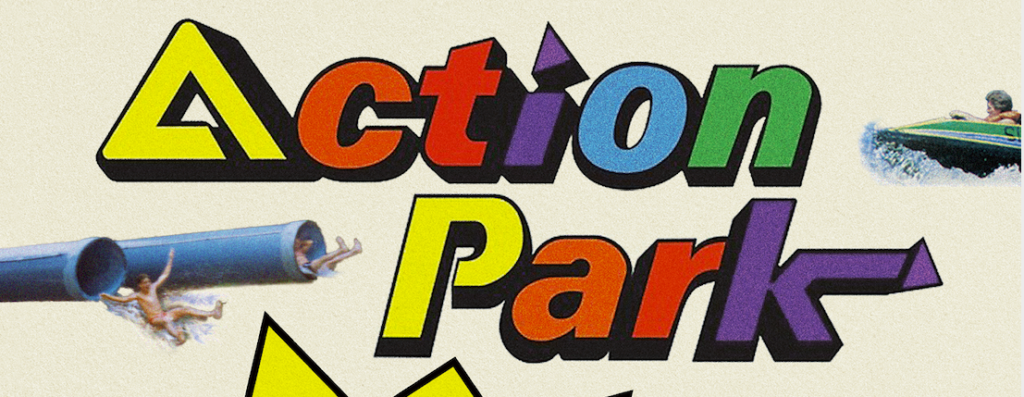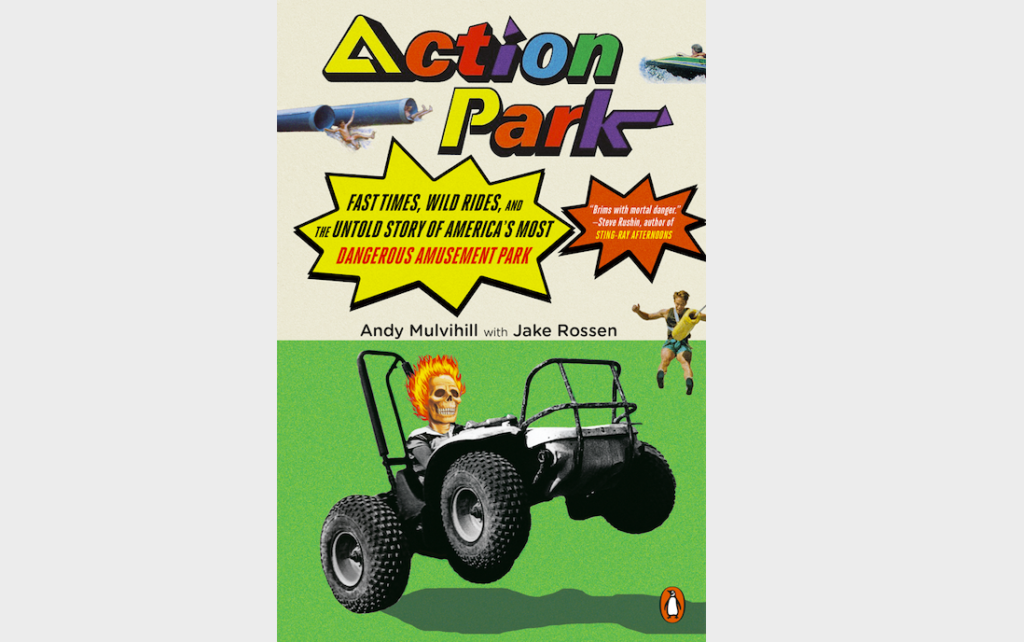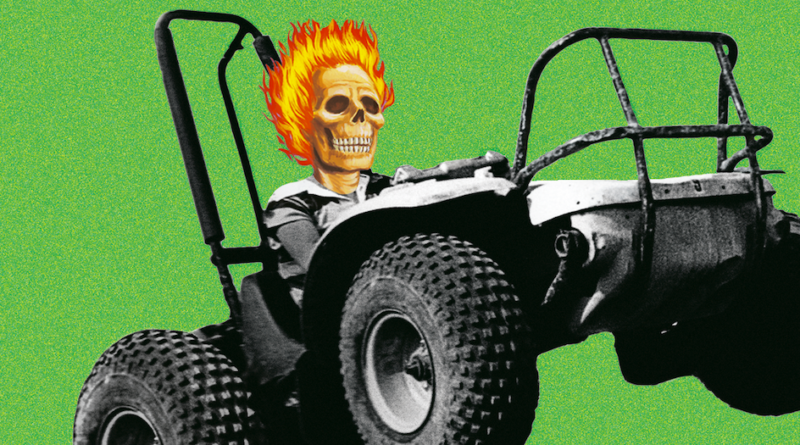INTERVIEW: A behind-the-scenes look at Action Park — as told by the owner’s son
Image courtesy of Penguin / Provided by official site.
Memories of Action Park, the former amusement park located in Vernon, New Jersey, run the gamut from free-wheeling fun to bodily injury and blood. The rides at the the park — some dangerous, some daring — amassed hordes of devotees who would head to the rural setting of this northern part of the state and try their hand at the Alpine slide, bumper boats, tidal wave pool or perhaps the most infamous of all, the cannonball loop (essentially a water slide that brought visitors around an aerial 360-degree loop).
Action Park, which is now closed, lives on in pop culture, and in recent years there has been a new fascination with founder Gene Mulvihill’s playground (sometimes dubbed Traction Park or Accident Park). A Johnny Knoxville movie called Action Point from a few years ago was apparently inspired by the New Jersey destination, and there’s a forthcoming HBO documentary called Class Action Park that promises to detail the injuries and deaths.
The late Mulvihill saw the park through many twists and turns, almost as many as his rides featured. His story of creating and developing the property includes so many cautionary tales and fascinating anecdotes: from employing many of the teenagers in the local area to dealing with a growing number of lawsuits to being indicted over his insurance practices. There were injuries along the way for some of the visitors and a few tragic deaths. There were also screams of laughter and long summer days when a young person could test their personal resolve (and stomach power).
Compiling all of these stories together was a daunting task, but Mulvihill’s son, Andy Mulvilhill, took up the challenge, and the result is the new book Action Park: Fast Times, Wild Rides, and the Untold Story of America’s Most Dangerous Amusement Park, co-written with Jake Rossen.
Andy knows the park perhaps better than anyone else. He worked there throughout his formative years before and during college, testing out rides, lifeguarding at the wave pool (this one seems to have been Action Park’s most dangerous attraction) and being a leader amongst a scrappy crew of young employees. He shadowed his father day in and day out, and he had to deal with a lot of the on-the-ground mayhem — everything from overflowing toilets to fights in the parking lot to trying to rescue swimmers who went underwater (this last one leads to one of the book’s most harrowing and unfortunate cases).
Action Park the book has a trifold mission. Not only does it tell the story of Mulvihill, the father, but also Andy, the son — all the while detailing the progress (and regress) of the park itself. These 300-plus pages are a perfect means to relive those summers in the Jersey sun, with the beer flowing, the rays bright in the sky and the thrills a mile a minute — and also when much of this vision came shattering down.
Recently Hollywood Soapbox talked with Andy about his experiences at Action Park and what it was like to write the book. Today, he and his partners still own and operate the Crystal Springs property near the former location of his father’s park. He has traded in the thrills for the more pleasant Grand Cascades Lodge and Minerals Hotel, plus six golf courses, some spas, banquet facilities, real estate offerings and a dozen restaurants.
Here’s what Andy had to say …

On his inspiration to write the book …
Everybody has got an Action Park story, but me and my friends and family, we’ve got hundreds. We tell each other these stories over the years, and we’ve talked about, ‘You know, we should really put this down in writing and share them.’ So when I saw Knoxville was doing a movie, originally I thought it was going to be a movie about Action Park, but I came to find out it was just inspired by it. I said to myself, ‘Andy, come on, let’s do it. It’s time. Enough time has gone by; give it a shot.’
So I did some research, and I figured out pretty quickly that if I really wanted to put out a good product, I had to hire a professional writer. So I started thinking where am I going to find a writer, and I said, ‘Why don’t I find guys that have written about Action Park before that I like?’ And I found this guy, Jake Rossen, and I checked out some other things he had written. It’s a pretty good résumé, got together with him and convinced him to put a book pitch together with me, which is a couple sample chapters, an outline, who the main characters are, and we took that and we went out to the marketplace. And we thought it was a good time to go out when the Knoxville movie was coming out. Little did we know the Knoxville movie would bomb, and we got turned down by quite a few publishers until Sam … at Penguin said, ‘Hey, I want to do it.’ And, lo and behold, we wrote a book.
On how he remembered all of the details of the story …
I worked there from the age of 14 to 22, so it was a big part of my life. And as you can imagine, some of the stuff that happened you just do not forget, so I had very distinct memories. And as you get older, you tend to tell the same story over and over again. It gets reinforced in your mind. What we did is we went out and interviewed all my brothers and my sister, and then all my friends and various people associated with the park, some of the ride designers, all sorts of folks. We were able to capture a lot more information and a lot more stories. We actually ended up with too much material and had to edit it down quite a bit.
On his father’s original vision for Action Park …
You’ve got to understand my father, which I hope I portray in the book, he was a fearless guy that was willing to take risks. He took the idea of skiing and applied it to the amusement park. He didn’t just want to have a typical amusement park where you get strapped in and spun all around. He wanted a participation park, so if you want to go on the bunny hill skiing and go slow, you can. But if you want a real thrill, you go up and ski the steeps and ski in the trees. There’s risk associated with that. Potentially you can get hurt, but he was OK with that as long as we communicated that to folks. And it just created a more thrilling place.
On the many lawsuits the park had to deal with …
Yeah, it created the challenges of lawsuits, but [my father] learned to manage those. I mean, he was very unorthodox in how he did it. He … was self-insured because he saw that the deductibles and premiums were so high. He thought it would be cheaper for him to just self-insure. The State of New Jersey certainly didn’t like it, and they went after him for it. If he had leased the property from anyone else he wouldn’t have had the sorts of problems other than the landlord may have terminated the lease, but they certainly wouldn’t have indicted him.
But, anyway, he managed the whole process, and we got to be good at defending ourselves. The way we would handle it is if something happened, the first thing we would do is we would interview the people right away, and 9 out of 10 times the person hurt would start by saying, ‘Well, I was messing around, or I didn’t follow directions, or I tried to jump on my friend’s head.’ And the times where we were deathly at fault, we would right away offer to settle without any lawyers being involved, offer to take care of medical expenses, etc., but where we felt we were in the right we would litigate. We became known as very, very tough litigators that did not settle, and we had a lot of success. It’s shocking how many times the court actually found in our favor — that people should have responsibility for themselves when they’re given the opportunity and given directions, so that’s kind of what went down.
On the luxuries of being the owner’s son …
When the LOLA cars first arrived on the scene, I think I was underage, but my father would let me drive them anyway. We would do it before hours or after hours, but the other thing I would do as I got a little bit older, and I would have friends come into town, I’d open the park in the middle of the night. And we’d go on the rides with my friends and have a good time. …

On how Vernon changed as Action Park developed …
Vernon originally was very rural. There was some mining that went on probably around the turn of the century, and there was a farming community. Then it became a bedroom community where it was really a series of single-family home developments and lake communities. There were a lot of lakes that were built, starting out as second homes but became full-time residents. I’d say by the ‘70s Vernon was pretty much established as a bedroom community, and that continued on and off through the years. I mean, the last 10 years, there’s been almost no building going on in Vernon.
But what the ski areas did is they brought another whole dimension to a pretty sleepy little town in the fact that it brought a big ratable and a big operating business where the streets of Route 94 in Vernon, which wouldn’t see much traffic, all of a sudden would be inundated with 10,000 people for a busy ski day or 15,000 to 20,000 people on a business amusement park day. So with that came certain frustrations. Some people probably didn’t want to see that. They didn’t want to wait in traffic on Saturday to go and get some milk, but what I think it afforded people is jobs for kids in the community, a whole lot of jobs, ratables so that we paid a lot in taxes to help keep the other property taxes down. And I would say it brought a lot of entertainment to the area. We had different bands that would come up and play, some rock legends. You could see Chuck Barry play up at the place … untold number of different entertainers, so I think it created kind of a place. We had our own little brewpub and had the festivals. It added a real dimension to the town, not without pain, not without some objectors, but I think on the whole people kind of loved the place a lot.
On his favorite ride at Action Park …
I really loved Surf Hill because it was a ride that required skill. It was a giant slip and slide with lanes, so you could race your buddies down. But what was really fun was the lane at the very end had a jump, and if you got good at it, you could soar through the air. There’s a picture in the book of a kid going off it. I got good; I could do flips off it. We used to really have a lot of fun, and kids that would come up there that love the ride as much as I, they’d spend the whole day going up and down the thing. Then at night the jump was adjustable, so we could make it so it was a more steep ramp and really fly through the air. So that ride was a whole lot of fun, and it had a very steep landing kind of like a ski jump. So you really didn’t get hurt on it because it was steep, and it was heavily padded. I really love that ride, for sure.
On what motivated his father and whether competition changed any of his plans …
He loved to create. He loved to build things. He loved to give people a thrill, and he probably would have done it whether there was competition or not because he just loved doing it. My mom often said that all the other work that my father did in his career, and there was a lot of other stuff, he did it just to make money to pump into the place and never really made a whole lot of money at the amusement park.
Yeah, there was a lot of other competition. There were places that didn’t exist when we started, and then cropped up, like Dorney Park put in a water park, Great Adventure put in a water park, there’s Splish Splash out on Long Island, I think the Land of Make Believe had one. Then you had Minor League Baseball leagues. There was a lot more competition as time went on for the leisure dollar, that’s for sure.
On his decision to share personal stories about his upbringing …
It is a memoir as a result of the request of Penguin. I really wanted to tell a story about Action Park and my dad. They asked me to tell the story from my perspective, but I can tell you there were certainly a number of my friends that said, ‘Sure, you can tell those stories, but you better change my name.’ There were some friends that said, ‘You better not tell those stories’ and were awfully nervous until they read the book, and then I had friends that said, ‘Absolutely use my name. I’m proud of all those crazy things I did.’ So it ran the gamut, but I think Penguin was quite bright with their editor and their lawyers to make sure that we were sensitive to people’s feelings.
Frankly, there was stuff I could have put in there that would have upset people, mistakes people made, silly adolescent things, etc., but I didn’t need to. There was enough stuff to put in this book without going there, so I really tried pretty hard to be sensitive and protective of family and friends in that regard. But I also was not afraid to tell the truth and talk about some of the rough stuff that happened because if I didn’t the story wouldn’t have credibility, and I really wanted the story to have credibility. …
By John Soltes / Publisher / John@HollywoodSoapbox.com
Action Park: Fast Times, Wild Rides, and the Untold Story of America’s Most Dangerous Amusement Park by Andy Mulvihill with Jake Rossen is now available from Penguin Books. Click here for more information.

